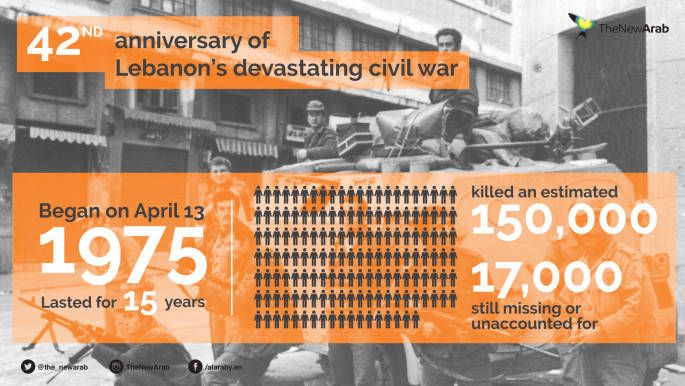Thousands still missing as Lebanon marks civil war anniversary
The multifaceted conflict, which began on April 13, 1975, lasted for 15 years and killed an estimated 150,000 people.
On Wednesday, people gathered for an event outside Beirut's National Museum, which once straddled the Green Line dividing Christian East Beirut and the Muslim West.
The rally, entitled "A New Page", was organised by local NGO Offre Joie (The Joy of Giving) and saw religious leaders and civilians gather to listen to speeches, read poetry, and reaffirm the desire for peace.
Participants waved Lebanese flags and carried placards renouncing violence and urging national unity, The Daily Star reported.
Prime Minister Saad Hariri, whose father was assassinated in 2005, warned that it was the duty of every citizen to ensure that the conflict would never be repeated.
"When the civil war broke out in Lebanon nobody knew it would last for 15 years, killing tens of thousands, wounding many and displacing the Lebanese people and destroying the economy," he said in a video posted on Twitter.
 |
When the civil war broke out in Lebanon nobody knew it would last for 15 years, killing tens of thousands, wounding many and displacing the Lebanese people and destroying the economy |  |
"Lebanon deserves a chance for peace and stability," he added, calling for an end to sectarian rhetoric.
The Lebanese civil war was multidimensional, pitting different religious communities against each other in fighting underpinned by economic interests and left-right political divides.
Although clashes had been building for years, large-scale fighting began after Lebanese Christian gunmen opened fire on a bus carrying Palestinians in a revenge attack, killing 28 people.
The war saw rapidly changing alliances, with intra-Christian and intra-Muslim fighting, large-scale massacres, and the invasion of the country by both Syria and Israel.
The war devastated the country's infrastructure and economy, displacing a third of the population.
Families mourn for the thousands still missing
In addition to the dead and wounded, one of the most painful legacies of the civil war is the fate of 17,000 civilians still missing or unaccounted for.
The Taif Agreement ended the war in 1990, but an amnesty law allowed many of its key protagonists to subsequently become leading political figures.
Under the terms of the agreement, no conditions were imposed on militia groups to reveal information about prisoners of war or those executed or kidnapped.
Since the end of the war, the International Committee of the Red Cross (ICRC) has pushed Lebanese authorities to clarify the fate of the missing and provide answers for grieving families.
In 2012, ICRC launched a project to create an information database of the missing. Last year, the international body began collecting DNA samples from families in a bid to match them with remains found in mass graves.
The project has been hindered by institutional inertia, with police unresponsive and government bodies lacking the required political will to facilitate the project.
 |
Mothers and fathers are dying heartbroken without knowing what happened to their sons and daughters. They have a right to know... |  |
On Thursday, as the country marked the civil war's 42nd anniversary, the ICRC once again urged the Lebanese government to prioritise finding and identifying the missing.
"The families of missing persons have been waiting for years, anxious to receive news about their loved ones," Fabrizzio Carboni, head of the ICRC delegation in Lebanon, said in a statement to Naharnet.
"Unfortunately, we are running out of time: mothers and fathers are dying heartbroken without knowing what happened to their sons and daughters. They have a right to know, and it is the responsibility of the Lebanese authorities to provide some answers."
The Lebanese government in 2000 acknowledged the existence of mass graves in Beirut, but it has made no effort to identify the bodies.
The ICRC has long urged authorities to create legislation on missing persons and adopt adequate mechanisms to provide answers for families, similar to post-conflict measures in Bosnia.
But with many of the militia leaders during the civil war now decision makers in Lebanon, the politics of amnesia and impunity will likely continue.
 |
|





 Follow the Middle East's top stories in English at The New Arab on Google News
Follow the Middle East's top stories in English at The New Arab on Google News


